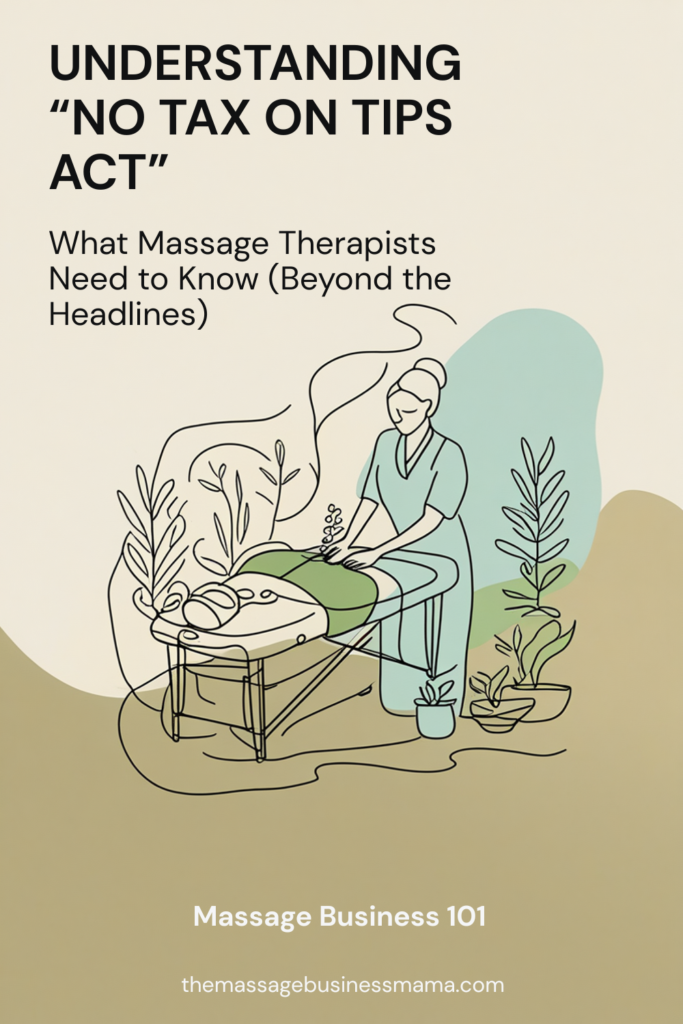In this post: Understanding the “No Tax on Tips Act”: what massage therapists need to know…the No Tax on Tips Act is being celebrated by some in the service industries, but there are several key details massage therapists need to understand before assuming it’s a tax-free free-for-all.

What Is the No Tax on Tips Act?
The No Tax on Tips Act passed in May 2025 and effective beginning with the 2025 tax year, allows workers in tip-based professions to deduct reported tips from their federal taxable income. The U.S. Treasury Department and the IRS included massage therapists on a preliminary list of occupations eligible for the “no tax on tips” deduction on September 2, 2025.
This means:
- You still report your tips as income.
- But at tax time, you can deduct up to $25,000 of those tips from your federal income tax calculation.
If you qualify, it could amount to hundreds or thousands in tax savings.
Understanding the “No Tax on Tips Act”: What Massage Therapists Need to Know
Massage therapists often receive tips—especially those working in spas, franchises, hotels, and even private practice. This bill recognizes tipping as a customary part of compensation in “beauty service” roles, which includes body and spa treatments.
So YES—massage therapists qualify for this tax break if:
- They receive tips reported to their employer (or themselves, if self-employed).
- Their total tips are within the $25,000 annual deduction limit.
MISCONCEPTIONS TO CLEAR UP
1. “It only applies to cash tips.”
Wrong.
The bill uses the term “cash tips” as a technical classification—but credit card, Venmo, checks, or any other reported gratuities count as long as they’re included in your earnings statement and reported properly. If you receive a tip—no matter the form—it qualifies if you report it.
The key: You must report the tips. Unreported tips do not qualify and are still illegal to hide from the IRS.
2. “I don’t need to report tips anymore.”
Wrong again.
This bill is a deduction, not an exemption. That means:
- You still report all of your tip income.
- But at tax time, you can deduct up to $25,000 of those tips from your federal taxable income.
3. “I won’t owe any taxes on tips.”
Sort of true, but…
This law only removes tips from federal income tax, not from:
- Social Security tax
- Medicare tax
- Self-employment tax (if applicable)
- State income tax (unless your state also enacts a similar rule)
So:
You’ll still pay payroll taxes on tips. But yes—your federal income tax bill will be lower.
4. “All tips qualify, even mandatory ones.”
Not true.
Only tips given voluntarily by the client count. Automatic gratuities (like a preset 20% service charge added by a spa or hotel) are considered wages, not tips, and therefore don’t qualify for the exclusion.
5. “This only helps self-employed massage therapists.”
False.
W-2 employees and self-employed therapists can also benefit. That’s because this is an “above the line” exclusion — it comes off your gross income before standard or itemized deductions are applied. As long as your tips are properly reported, you can claim it regardless of employment type.
6. “This is a forever change!”
Nope.
The current law is set to expire after 2028 unless it’s renewed or made permanent.
7. “This is just a trick to make us report tips.”
Some massage therapists are skeptical—and understandably so.
This bill might be partially strategic: by offering a tax break, the government encourages more accurate tip reporting. It’s a “carrot” rather than a “stick” approach. But if you’re already reporting your tips honestly, it shouldn’t matter.
Income Limits & Phase-out Rules
1. Income Eligibility Cap
- You qualify only if your adjusted gross income (AGI) is $150,000 (single filer) or less (or $300,000 for joint filers) for the full deduction (Kiplinger).
- If your AGI exceeds these amounts, the deduction gradually phases out—reducing by $100 for every $1,000 you earn over the threshold (Littler Mendelson P.C.).
2. Income Eligibilty Floor
There’s not just a cap on income—you also have to meet a minimum income floor to qualify for the deduction.
This chart shows the minimum income floor to qualify for this tax deduction if you are under 65:
| Single | $14,600 or more |
| Head of household | $21,900 or more |
| Married filing jointly | $29,200 or more (both spouses under 65) $30,750 or more (one spouse under 65) |
| Married filing separately | $5 or more |
| Qualifying surviving spouse | $29,200 or more |
KEY POINTS FOR MASSAGE THERAPISTS
- You do not need to itemize deductions to claim this.
- Applies to cash tips reported to an employer (or reported properly on your taxes if self-employed).
- You can deduct up to $25,000 in tips.
- No change to how tips are reported—this just changes what happens after they’re reported.
WHAT TO DO NOW
- Keep reporting your tips honestly. This deduction only applies to reported tips.
- Talk to your tax professional in early 2026 (for your 2025 taxes).
- Track tips separately in your records—it may make filing easier.
- Watch for the IRS list of approved tip-based professions, which should include massage under “body and spa treatments.”
References:
https://bipartisanpolicy.org/explainer/how-does-no-tax-on-tips-work-in-the-one-big-beautiful-bill
